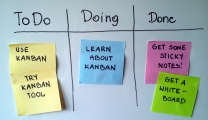1. Foster Efficient Communication
Clear and effective communication has always stood at the forefront of a successful project. Yet ironically, in times when communication channels are ever so abundant, an exchange between colleagues has become anything but clear and productive. And if your communication lacks order and organization, it will have a detrimental effect on a business, one that’s greater than miscommunication itself.
This is where skilled project managers come in. Not only is a successful project manager able to establish a highly collaborative environment, he or she also knows how to promote engagement and keep the conversation sane. Understanding the value of maintaining well-organized information is the first step towards a productive culture in your team.
Many teams get carried away by tools and virtual technologies to the point of neglecting face-to-face collaboration. It is important to make sure that project meetings are scheduled regularly and on an ad hoc basis. Help the team find their most comfortable way of discussing their tasks and ask questions. The daily standup meetings are a good way to set a productive mood for the team and start the day on the right foot.
Projects with the highest success rate usually involve customers in the process. This is where truly effective project managers shine. By bringing the team and the customer close together, a good project manager will effectively shorten the customer-service loop and gain a better insight into the customers’ needs. In return, the team can adopt customer feedback to minimize the risk of waste and rework when their product or service is ready for the market. Why not have a fruitful, and if the vibe is right – friendly relationship between all parties?
2. Manage Workflow, not People
Most project managers tend to get caught up in the futile practice of micromanagement.
A team whose manager is distrustful stands no chance of succeeding. But a team with a manager who is capable of taking responsibility without being control-obsessed is in much better hands.
Such a project manager will know that excessively controlling the team and relocating them (or worse – blaming them for shortcomings) is never a solution. Instead, hiring the right people for the right roles and providing coaching, training, and personal development is key to dissolving micromanagement.
The dated stereotype of a strict organizational structure with ample rules in place is almost extinct. Modern project managers trust and respect the capabilities of their teams and focus on resolving bottlenecks and improving delivery times.
They also know workflow efficiency is the cornerstone of successful projects. Creating a smooth workflow without delays and impediments is one of the project managers’ top priorities. And to do that, one has to prevent obstacles and bottlenecks from happening early on and settle conflicts with care and no delay.

3. Make Data-Driven Decisions
Project managers are there to make decisions. And they typically get evaluated by the amount of right decisions they make. How can they maximize this amount? The only way to back one’s decision with a valid argument is to have data behind your actions. Most companies have the figures but don’t know how to use them and seldom leverage their power.
Kanban analytics help successful project managers keep track of delivery times, spot bottlenecks right off the bat, and rely on high probability estimates. Cumulative flow diagrams and cycle time scatterplots can help you increase productivity, identify areas for improvement, and optimize the entire value stream of your business.
By using these data-driven analytics you can bolster your project outcome. In other words, measure, and objectively observe first before implementing changes based on facts.
4. Manage Expectations and Say ‘No’
In a highly saturated market, business and client requests are constantly coming in. However, a successful project manager understands it’s imperative to say no at times; respectfully but firmly.
If your to-do list is brimming with tasks, you ought to ask yourself whether your team is capable of handling new work at all. It’s an art to manage customer and stakeholder expectations. A successful project manager is aware of the capacity of their team. He or she is also able to think before clinching the deal and say no if needs be.
Putting the well-being of your team and managing realistic expectations is a crucial project management approach. This way, great project managers protect their team from burnout, their workflow from getting stuck, and their project from unavoidable and expensive delays.
Refusing a business or customer request can be challenging but it is the most important step towards efficient work prioritization. The fast and rapidly evolving market means business teams need to identify work carrying the highest value to their business and pick up due tasks based on their importance and urgency. Efficient prioritization ensures competitive advantage and improved workflow as well as quality deliverables that meet the client’s requirements and deadline.

5. Promote a Climate of Continuous Improvement
It’s no accident that companies that failed to innovate ultimately ceased to exist. As a project manager, it is your duty to ensure all members are gaining new skills at all times. Assuming your team knows it all and requires no regular training and education can result in business failure.
Successful project managers know that time for self-improvement is essential and they encourage it. One way to do that is by managing team idle time. Some companies have embraced the policy to reserve as much as 20% of their employees’ time for training, reading, and polishing their skills.
Similarly, they have a designated budget for conferences, courses, and seminars. Software companies that organize Hackathons are a great example of this strategy. What a great way to promote positive competitiveness among your colleagues while at the same time encouraging self-improvement and fun.
Continuous improvement is crucial for optimizing business processes and ensuring employees are expanding their skillset and advancing in the right direction.
Team retrospectives are an increasingly popular strategy when it comes to identifying areas of improvement within the team. Gather the team around, make sure everyone is feeling comfortable and safe before asking to reflect on their performance in the last couple of weeks. The following questions are a great starting point:
- What Went Well?
- What Obstacles Have We Encountered?
- What Did We Learn From Both?
- What’s Still Unclear?
- How to Move Forward?
Successful project managers will take action based on the feedback from their team. Furthermore, a good project manager will make use of the Kaizen method to promote gradual improvement based on past shortcomings.
Finally, never underestimate the profound impact team involvement can have. To achieve continuous improvement, you need to ensure all members are fully committed to business growth. This cohesive progress is the end goal of every successful project manager.












Replies to This Discussion